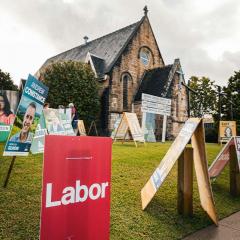
Human rights are under attack from the creep of anti-terror style legislation to the criminal justice system, UQ law lecturer Dr Rebecca Ananian-Welsh has warned in a recent report.
Dr Ananian-Welsh said extreme measures aimed at preventing terrorism had been adopted in Queensland’s so-called “anti-bikie” laws.
“There is an increased reliance on secret evidence, crimes of association and the reversal of the onus of proof, even in the criminal justice system,” she said.
“The risk is that these sorts of extreme measures come to be seen as normal, and are ramped up further or applied to other scenarios within a relatively short timeframe.
“No reasonable person would want to see a proliferation of dangerous gangs or organised crime but, in practice, the laws apply to a range of situations that fall outside what that same reasonable person might consider the spirit of the law,” she said.
Take the situation where three or more young people decide to buy arecreational drug. While this might once have been considered barely more serious than youthful hijinks, they could technically be considered a criminal gang under the conditions of the VLAD Act and face a mandatory sentence of 15 years’ imprisonment without parole:
- Participating in the activities of a group (any legal or illegal group of more than three people)
- Committing a declared offence while participating in the group (drug possession)
- The group’s purpose is to commit the declared offence – and, it is important to note, this is presumed. The onus is on the individual to prove otherwise.
“The Queensland legislation has been in place for almost two years, but there is no evidence to suggest it has done anything to prevent serious organised crime,” Dr Ananian-Welsh said.
“However, it does have a severe and disproportionate impact on basic civil liberties – the right to express ourselves through our clothing, to associate with whoever we choose, or even to attend places or events that most other people can.
“As a society, what price will we pay for bowing to political pressure to look tough on crime?”
Despite an imminent review of the Queensland legislation, a bill to introduce equally tough anti-bikie laws is currently before the South Australian parliament.
Dr Ananian-Welsh said recent trends indicated that if the South Australian legislation is passed, other states may follow.
“We’ve seen this style of legislation spread from state to state in the past, despite there not being any proof that it works,” she said.
The background
In the wake of 9/11, Australia’s federal Parliament enacted exceptional measures aimed at preventing terrorism. These included the use of control orders, which place a range of restrictions and obligations on an individual, and can be imposed without that individual having been found guilty of a crime ie. they can be imposed purely to prevent possible future criminal activity.
The legal case Thomas v Mowbray validated the use of control orders as a way of placing restrictions on “would-be” terrorists. Within a year, South Australia had introduced the Serious and Organised Crime (Control) Act, which not only adopted the legal model of control orders in organised crime situations, but also used the same rhetoric of urgency and extreme threat to justify it.
Similar schemes were subsequently introduced in every state and territory except Tasmania and the ACT. After the Newman government came to power in 2012, it took an even harder line, introducing new measures touted as the toughest in Australia, and even the world.
Until recently, other states had not followed suit.



